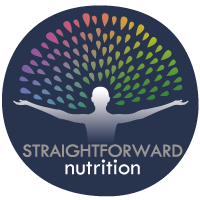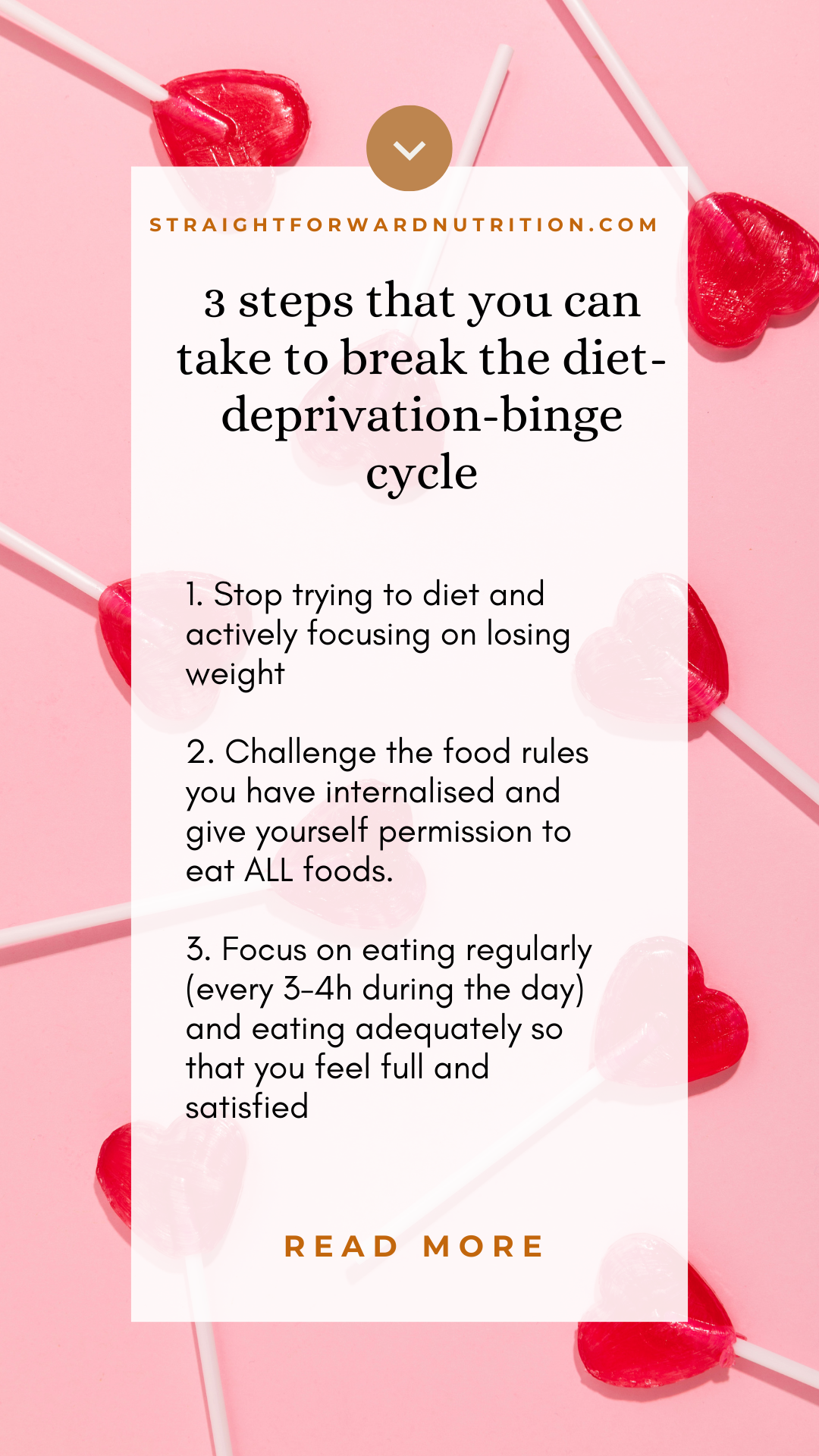Explaining the Diet-Deprivation-Binge Cycle - How restriction drives binge eating
When someone comes to me to work on their relationship with food, and in this case binge eating and emotional eating I often find myself starting by showing them a visual of the Diet – Restrict – Binge Cycle.
I do this for two reasons.
To show my client that they, nor their body is broken
To show my client that the binge or emotional eating is s symptom, and not the root cause of what’s typically going on.
When you find yourself in a binge episode, it feels so out of control. It is so uncomfortable, both physically and emotionally. It really *feels* like the food and the lack of control is the problem that we have to fix.
And if you’re gaining weight as a result of the binge or emotional eating then you might panic even more and this thing with food and eating *really* have to get under control. I know for sure that this is how I felt, when I was smack bang in the middle of it.
Also read: When do you know you have healed your relationship with food?
Years later, I learned about the Diet – Restrict- Binge Cycle and I felt such a relief. No wonder I had spent years going around this cycle. Any and all of the diets that I tried was never going to work to get my binge eating under control.
Why? Because they all implied some kind of restrictive eating. It was either restricting calories or sugar or gluten or fat or some other kind of food group. The restriction kept fuelling my binge eating.
And I had no idea (at the time) that these two were connected and that it in order to stop bingeing I would have to stop restricting.
How does restriction drive binge eating?
The cycle will always start from some kind of restriction. It might be a diet, a need to cut out some specific foods for medical reasons or it might be as a result of not having enough food available for awhile due to lack of financial means. It doesn’t really matter why you are restricting as the body will experience the lack of food the same, as a state of famine.
(Step 1 – Restriction) For this example let us imagine that you are starting a new diet. One that is going to support your “health”. (I have health in quotation marks here because diets are rarely about actual health but about thinness.)
(Step 2 – Feeling hungry / starvation) The diet is going well… until you find yourself hungry, and perhaps also tired and stressed out. It is hard to have the bandwidth to deal with life on an empty stomach and undernourished brain.
(Step 3 – Breaking the Diet ) Maybe someone has brought in a cake or donuts to work and even though you say no to when offered, you still find yourself eating a large slice in secret afterwards.
The cycle keeps going
Once you’ve stepped outside the confines of the diet a few things tend to happen:
You find yourself thinking “Well I have already blown my diet so I might as well keep going now”. And then proceed to binge on all or the foods you don’t normally give yourself permission to eat. Or you might polish off the rest of the cake / packet of biscuits, even though you don’t really feel like eating them but you want them gone now, so that they won’t be there tempting you in the future.
(Step 4 – Shame / Guilt / Frustration / Anger) Another thing that can happen is that the shame and guilt over eating in secret and eating more than / something that wasn’t on your diet plan sends you into a spiral and because food is the main coping tool you have, you find yourself planning a binge later. Or maybe you just keep eating because why the H*ll not?!This backlash binge eating often comes from hurt, pain and wanting to punishing ourselves for the initial “transgression”. And the initial “transgression” happens as a result of undereating, leading to feeling overly hungry and food being present.
It is natural to eat when we are physically hungry! And when we are overly hungry, it is even harder to make executive function decisions, so grabbing what is available makes total sense.
(Step 5 – Fear of weight gain / desire to get back in control) This is where you’ll find yourself in the aftermath of the binge episode. Often sitting a pool of shame, self-blame and self-loathing, it makes sense to reach back out for another diet or to “get back on the diet-wagon” again. Something that will simply put you back in the place of restriction, and so the cycle continues.
We have to address the restriction in order to heal the binge eating
This cycle can happen is a day or it can happen after days or weeks or even months of restricting. If the restriction has been going on for weeks or months, then it is not unlikely that the binge eating will happen over several days or weeks too.
With the Diet – Deprivation – Binge Cycle we are trying to fight physiology, and that is not supposed to work. If you are finding yourself binge eating after restricting food (or food groups) for a while, there is nothing wrong with you. In fact I would argue that your body is working quiet well.
Our bodies don’t want to be in a state of famine, that is not helpful to survival so when food becomes available we will naturally eat more than we need, because we are trying to make up for the restriction and as well as that we might also eat more because who knows when food will become available again??
It is important that this is often happen subconsciously. This is your body doing its best to keep you alive.
How do you step out of the Diet – Deprivation – Binge Cycle?
Try and let go of dieting. I know it sounds easy, but it can be pretty difficult because it brings with it the need to explore why you have been dieting in the first place. But this is really the first step because remember: restriction drives binge eating.
Work on letting go of all the internal food rules and give yourself permission to eat ALL foods.
Focus on eating regularly and adequately. This means eating every 3-4h with meals and snacks. Eating adequately means eating enough food that meets the energy needs of your body and enough to feel full and satisfied.
Of course this sounds simple but it often isn't so if you are looking for some 1:1 support, feel free to book in for a free initial 30 min consultation here .



